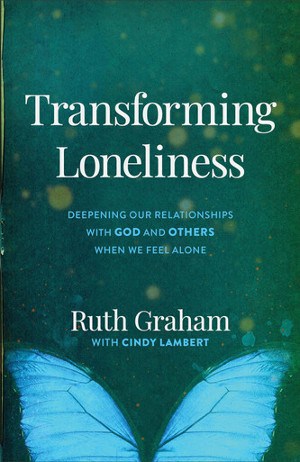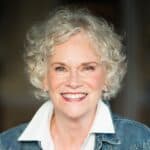Preview:
Ruth Graham: So I had to go home to Mother and Daddy, and I wondered what were they going to say to me, what was I going to say to them, and would they say, “We told you not to. You made your bed, now you have to lie in it. We’re tired of fooling with you?” And as I rounded the bend in my parents’ driveway, my father was standing there. When I got out of the car, he said, “Welcome home.”
End of Preview
John Fuller: That’s Ruth Bell Graham, the daughter of the late evangelist Billy Graham, describing a time when she failed, and it was a time of redemption in her life as well. We’re going to hear more from her today about her life and her faith journey on Focus on the Family with Jim Daly. Thanks for joining us. I’m John Fuller.
Jim Daly: John, it was my privilege to meet with Ruth Graham in her home in Central Virginia, and that’s where I had a chance to hear some of her remarkable stories. I mean, each of the family members have great stories about growing up as a Graham.
John: Mm-hmm.
Jim: And, uh, she’s named after her mom, and we’ve had other members of her family on the program in the past-
John: Right.
Jim: … including Franklin. Ruth has experienced some major challenges in her life, health issues, failed marriages, loneliness, uh, feeling unworthy before God and her family, as we heard in that opening clip. I was touched by Ruth’s vulnerability, her willingness to open up her life a bit and reveal what God has taught her through the mistakes she’s made, and how faithful the Lord has been in her journey. And we also talked about a book that Ruth has written, called Transforming Loneliness, which offers some fascinating research and insights about how loneliness has become an epidemic in our society today.
John: Mm-hmm.
Jim: It’s kind the number one thing, uh, but as we’ll hear, Ruth has discovered how loneliness can actually draw us closer to the Lord.
John: Yeah. And for listeners, uh, please know that Focus on the Family is here for you if you’re struggling with loneliness, uh, maybe you feel isolated and far away from loved ones, or even from God. If that’s the case, please call one of our caring Christian counselors. We’ll schedule a time for them to call you back. Uh, they’ll talk with you. They’ll pray with you. They’ll help you, uh, find some hope in your situation. Our number is 800-232-6459, 800, the letter A, and the word FAMILY, or stop by focusonthefamily.com/broadcast to get started. And here’s how the conversation began with Ruth Graham on today’s episode of Focus on the Family with Jim Daly.
Jim: Ruth Graham, it is great to have you with us on Focus on the Family.
Ruth: Thank you very much.
Jim: Thanks for opening up your home.
Ruth: Oh, I’m delighted y’all wanted to come. It’s great.
Jim: Yeah, this is great. It’s such a treat to get out of the office, right (laughing)? Well, listen, uh, let’s start with what, uh, was going on in your thinking about this topic of loneliness. I mean, most people, this is a difficult topic to write about.
Ruth: Yes, it is.
Jim: Why did you want to write about this?
Ruth: Um, I’ve been alone most of my adult life, and I was particularly prompted when, several years ago, I had back surgery to remove a benign tumor. And, um, things went well, and then I came home and things did not go well, and I had to go back to the hospital, had to lie on my back for days, I mean, like 10 days-
Jim: Mm-hmm.
Ruth: … because I had one of those spinal fluid things. And, um, they came in and said, “You have to have the surgery redone,” and, of course, my girls lived far away, so, I, um, I was there by myself, and I couldn’t move because of my back. And I couldn’t reach the water, couldn’t put the covers over me. So I was really lonely.
Jim: Huh.
Ruth: And I, of course, I, I knew God was with me, but I wanted a human (laughs) somebody there, and I, I didn’t have that. And then, when I went to boarding school, I was profoundly lonely.
Jim: I was going to say that that it … so it was an epiphany, a moment, that created that sense of loneliness.
Ruth: Mm-hmm.
Jim: Was it always under, uh, kind of just under the soil a little, or was that sense of loneliness kind of that stark, “Wow, I don’t have anybody to help me get a glass of water?”
Ruth: Well, I think, if you live alone, there is, uh, a level of loneliness that you experience, and I did n- … I would not have said I was a lonely person, but, slowly, imperceptibly, I realize that, yes, there are times of, of real loneliness.
Jim: You refer to loneliness as an ache.
Ruth: Mm-hmm. Mm-hmm.
Jim: So, you know, when we have aches and pains (laughing), we usually medicate somehow, but in that context, what, what do we do with that loneliness? How do we take care of that ache?
Ruth: Well, a lot of people do self-medicate and do things like that, um, but that’s not what we need to do. We need to turn to God. We need to focus on the Lord Jesus Christ, ’cause He has promised that He is with us all the time.
Jim: Mm-hmm.
Ruth: We, so we’re never really alone. And when we have the Holy Spirit in us, then we’re not alone. That’s not a human being. Sometimes we want Jesus with skin on him, um, but we don’t have that right now, so we have the word of God. We have friends, uh, and I think friends are very valuable when you’re lonely. But people find it hard to admit that they’re lonely.
Jim: Yeah.
Ruth: Um, I did have a young woman come into my office one day and say, “I’m lonely,” and that was a great place to start, so I was grateful that she did that. Um, but people are embarrassed to say they’re, they’re lonely. They would rather … professionals have said people would rather talk about depression than loneliness.
Jim: Huh.
Ruth: And I experienced that (laughs) myself, um, doing research for this book. I was reading books on loneliness, and I thought, “Well, I’m going to a speaking engagement. I will take a book with me,” and I put it in my bag and got on the airplane and pulled it out. It had loneliness in the title, and I thought, “That man sitting next to me is going to think I’m lonely,” so I put it back in my bag (laughing). There’s sort of a sense of a shame, like we’re deficient somehow.
Jim: Well, no, and I appreciate that, that idea of shame.
Ruth: Mm-hmm.
Jim: Uh, you know, in the Christian community particularly, there’s so much shame that can come, uh, a lot of it internal. You know, we assume people will not see me in a better light if I admit these things.
Ruth: Mm-hmm.
Jim: It’s kind of the worst part of our faith, right? And it’s not where the Lord wants us to be-
Ruth: No, no.
Jim: … but it is hard for us because we think, if we have a relationship with God, we shouldn’t … and fill in the ba- blank.
Ruth: Mm-hmm.
Jim: We shouldn’t be lonely. We shouldn’t, uh, have anxiety. We shouldn’t be depressed. And people struggle with that shame, I would say mostly self-imposed. Would you agree?
Ruth: I think so. Um, we often quote that verse, “If any man be in Christ, he’s a new creation,” and we think that that’s going to be … everything’s going to be great. Well, it’s not, and so then we feel shame that we’re not living up to the standards that we’re supposed to live up to.
Jim: Yeah. You, you, rightfully, look to the Scripture for support, and I think it’s Psalm 68:6 that you quote about this idea of loneliness. What, what is that Scripture?
Ruth: That is that God makes a home for us.
Jim: Ah.
Ruth: People are lonely, God makes a home for us. And, for me, the better part of any trip is coming home, and isn’t that where we want to be? We want to be home safe.
Jim: Absolutely. That’s the feeling-
Ruth: Yes.
Jim: … that you want to have-
Ruth: Yes. Uh-huh.
Jim: … you know, that you’re in a good place.
Ruth: And God provides that for us.
Jim: I remember, boy, I think, when I went to college … of course, I, you know, I was coming out of a really rough childhood, an orphan kid. My mom died when I was young. My … I went to foster care. My dad reappeared, ’cause they had been divorced. Stepdad took off day of the funeral. There’s a lot of loneliness in that, and I remember going to college my sophomore year and I, I remember having to stay in the dorms during Christmas ’cause I had nowhere to go. I had to petition the school, and they said, “Well, you know, all the electricity is going to be shut off. You can stay in your dorm.” But, boy, talk about a feeling of loneliness-
Ruth: Mm-hmm.
Jim: … being on a college campus by myself. And, uh, you know, it’s a metaphor for what people can feel, like you’re on an island, we say that, but what, for you, what was that feeling of loneliness like? Describe what, what that sense was.
Ruth: It was a sense like something was off, something wasn’t quite right. Um, and I don’t know … uh, we did do research with, uh, military wives and how they felt lo- … what loneliness felt to them, and they said helpless, um, lost, at lost ends, uh, very sad words.
Jim: Right, not positive things.
Ruth: No, none of it. No, none of it.
Jim: Yeah.
Ruth: Uh, that nobody knew them and they were alone. So I just, um, for me, loneliness is, um, just an ache that, that something’s not right-
Jim: Uh-huh.
Ruth: … and I, I can’t, I can’t fix it.
Jim: Yeah. When you look at, at loneliness in the culture, uh, we often look at anxiety and depression statistics, and coming out of COVID, there’s been a lot of anxiety and depression, uh, loneliness is right, right there though.
Ruth: Oh, yes.
Jim: What’s some of that data?
Ruth: Well, didn’t Vivek Murthy say that, um-
Jim: Surgeon general?
Ruth: Yes, uh-huh.
Jim: Yeah.
Ruth: … that underlying most clinical diseases is loneliness, um.
Jim: Boy, think of that.
Ruth: I know. It really is powerful. And, um, I think it was Cigna surveyed 40,000 Americans and found that, I’m not good with numbers, but I think 47% feel alone, 45% feel that nobody knows them well, and, uh, then zero … the millennials feel like they have zero friends.
Jim: Boy, that’s something. In a digitally-connected environment, they feel like they have no friends (laughs).
Ruth: Well, I asked about that who’s, who’s a Generation Z, and he said, “Yes, we are lonely. We’re a very lonely generation.” He said, “We have lots of connections, but no real connections.”
Jim: Ruth, uh, your background, many people may not know, uh, you were married four times.
Ruth: Mm-hmm.
Jim: Um, speak to that, um, situation, if you could.
Ruth: Oh, certainly.
Jim: I mean, your first marriage, all the way … a lot of people are going, “What (laughing)? Ruth Graham?” Uh, what took place and maybe, you know, what you learned through that experience, or those experiences?
Ruth: Learned to survive (laughs).
Jim: Right.
Ruth: But, um, as a little girl growing up, I wanted security. Well, everybody wants security. And I would’ve told you Jesus is my security-
Jim: Right.
Ruth: … but that wasn’t true deep down where the secrets are kept, and I grew up looking for security. So as soon as I was able to marry, I married a man who was a little bit older than I was, and we were married for 21 years when I discovered he had been unfaithful for a number of years with several women. And we tried to reconcile, but I just … he had broken my trust and my heart and I couldn’t reconcile, and I learned that forgiveness is unconditional. Reconciliation is conditional. And that was a very important thing for me to learn. And then I had a rebound marriage that lasted about three months-
Jim: Mm-hmm.
Ruth: … and came on back home, I’d moved away and came back home, and, um, fell in love with my best friend. And he was just great, so kind, so good to me, and then he decided he didn’t want to be married anymore after 10 years, broke my heart, truly broke my heart, love of my life.
Jim: Aw.
Ruth: And then I was single, you know, for a while and this man who I’d known for a long time, he was a counselor, he was a pastor, he came along and started courting me. I thought, “This is great. He can help support me and my ministry,” and so we married, and that lasted a year and a half, and he was, uh, a narcissistic sociopath.
Jim: Wow. I mean, that, that’s a heavy landing point.
Ruth: It was, it was a very stressful time, but God brought me out of it a stronger person, and it also cured me of my security. I knew that I was secure. And one of the issues that I had was, growing up with a dad who was gone all the time, I didn’t have him to tuck me in bed or help me learn to ride a bicycle, and so I was looking for somebody. And I had a friend who said to me, “Ruth, you felt abandoned as a child,” and I said, “No,” ’cause I would never have criticized my father ever, and I th- … ’cause he’s my hero. But then I realized, yeah, that’s the piece that’s missing. I need to put that in there. And once I realized that-
Jim: Yeah.
Ruth: … everything was settled.
Jim: And, you know, what’s so interesting, of course, for those that aren’t connecting the dots, this is Billy Graham, your father.
Ruth: Mm-hmm. Yeah.
Jim: Um, but how those seeds of loneliness-
Ruth: Mm-hmm.
Jim: … start so early-
Ruth: Mm-hmm, but they do.
Jim: … so young.
Ruth: Mm-hmm.
Jim: And it, it does feed your emotions and your behavior over time, doesn’t it?
Ruth: Mm-hmm. It does. And I think, um, you know, my father, who I really did adore and miss him every day-
Jim: Yeah.
Ruth: … but, um, he put ministry first.
Jim: Yeah.
Ruth: And so many times, pastors and, and workers do and the family’s the one that pays the consequences.
Jim: Yeah.
Ruth: And I def- definitely, um, felt the consequences of his absence.
Jim: Where are you in the birth order?
Ruth: I’m the middle.
Jim: So you’re in the middle (laughing). That’s also a lost area-
Ruth: Yes, uh-huh.
Jim: … if you talk to Kevin Leman-
Ruth: That’s right (laughs).
Jim: … about the birth order.
Ruth: Uh-huh.
Jim: I mean, the middle child is usually the one that learns how to negotiate-
Ruth: Mm-hmm.
Jim: … and kind of, uh, plays that middle position, right?
Ruth: And, also, more like my father than the others-
Jim: Oh, interesting.
Ruth: … uh, because I’m, I’m more, um, an introvert, and he was too.
Jim: You know, I think, again, I don’t want to miss the point of what you’re saying, because that would apply to a business person.
Ruth: Mm-hmm.
Jim: Both moms and dads today-
Ruth: Yeah, that’s right.
Jim: … can be so distracted and so busy. Uh, did you ever talk to your dad about it?
Ruth: He … by the time I came upon this awareness-
Jim: Yeah.
Ruth: … uh, he was not able to communicate.
Jim: How about, uh, going through the divorces and … that had to hurt his heart.
Ruth: My father was so warm and gracious and loving-
Jim: Yeah.
Ruth: … and forgiving. He gave me unconditional love-
Jim: Yeah.
Ruth: … and he gave it to all of us. And I, I told the story, when, at his funeral, that I had married the second man after Mother and Daddy had said, “Don’t do it. Don’t … you know, let’s wait and see what this man’s like,” and I went ahead anyway, headstrong and willful-
Jim: Wow.
Ruth: … married him anyway, and within 24 hours, I knew it was a b- big mistake and I had to flee the state. So I had to go home to Mother and Daddy and I wondered what were they going to say to me? What was I going to say to them? And as I rounded the bend in my parents’ driveway, my father was standing there. When I got out of the car, he said, “Welcome home.”
Jim: Wow. Yeah, what a feeling.
Ruth: That changed … that grace changed my life.
Jim: Wow.
Ruth: Mm-hmm.
Jim: And that’s what everybody wants to feel.
Ruth: That’s right. That’s right.
Jim: Unfortunately, you know, so many people don’t have that father-
Ruth: Mm-hmm. That’s right.
Jim: … waiting.
Ruth: Mm-hmm. That’s why … that’s a picture of what God is like. It’s like the prodigal son.
Jim: Exactly.
Ruth: God is like that. We can come to Him, run to Him in His arms, battered, bruised, broken, sinful, and He just welcomes us.
Jim: Ruth, so often, people get a picture of God as the stick-carrying, (laughing) stick-wielding, judgmental, righteous God-
Ruth: Mm-hmm.
Jim: … who is only interested in your behavior.
Ruth: Mm-hmm.
Jim: That is not, uh, the healthy view of God.
Ruth: No, no. I think we have to approach God with reverence, because He is a holy God-
Jim: Right.
Ruth: … but He wants us to come to Him, and He sent Jesus to be as we are so that He would un- … not that he would understand, ’cause he d- doesn’t … understands everything, but that we could identify, I guess, with Him. And, um, God is a great God and we can’t presume on Him.
Jim: And I wish people that don’t know the Lord would understand that, that if you had a really strict father-
Ruth: Mm-hmm. Mm-hmm.
Jim: … for example, which is often the origin of it-
Ruth: Mm-hmm.
Jim: … who came after you for the dos and don’ts and the rules, especially in Christian homes that were run that way, it really alienates the children-
Ruth: Mm-hmm. It does.
Jim: … from a loving relationship-
Ruth: It does.
Jim: … and emotionally and spiritually, they end up lonely.
Ruth: Well, the friend … I had a friend who wrote a book, Distorted God, because he had such a distorted picture of his earthly father-
Jim: Yeah.
Ruth: … and how he worked through that. And, and we, and we do look at her fathers and, and see God. I mean, that’s, uh, that’s the God figure in our lives. And if we are abused, if we are neglected, um, that affects our relationship with God.
Jim: It does. I, I remember encountering a person who’s now a friend, I would call him a friend, from the, um, LGBTQ community, and he said his father, when he told him he was homosexual, his dad burst into tears and said, “I love you, but I never want to see you again. Get out of my house.”
Ruth: Oh, my.
Jim: And this is a Christian home.
Ruth: Oh, no.
Jim: And I remember saying to him in that moment, I said, “Well, if that was your earthly father, how do you have a relationship with your heavenly Father?”
Ruth: Yeah.
Jim: And he leaned in to me and said, “Oh, it’s easy, I don’t,” and I just responded with, “Well, maybe that can change.”
Ruth: Mm-hmm. Mm-hmm.
Jim: And, you know, God is always present in His love for you-
Ruth: Absolutely.
Jim: … and each one of us. He loves everybody He’s created.
John: This is Focus on the Family with Jim Daly, and today, you’re listening to a conversation Jim had with Ruth Graham, daughter of the late evangelist Billy Graham, on the topic of loneliness. And Ruth has written a book called Transforming Loneliness, and you can get a copy of that when you call 800-232-6459, 800, the letter A, and the word FAMILY, or stop by focusonthefamily.com/broadcast. Let’s return now to the conversation with Ruth Graham on today’s episode of Focus on the Family with Jim Daly.
Jim: You have a story in the book about, uh, Hagar-
Ruth: Mm-hmm.
Jim: … Abraham and Sarah’s servant. How did apply to loneliness?
Ruth: Well, she was, uh … I don’t know if they bought her or they got her in Egypt, and took her out of her culture, out of her community, and started traveling with these nomads. And she didn’t have a place, she didn’t have a home, she didn’t … um, and she was just their servant. And, eventually, I guess she became Sarah’s servant, and Sarah and Abraham had wanted a baby, God had promised them a baby, and it hadn’t come, it hadn’t come. Year after year, they waited. It hadn’t come, and, um, I think probably there was gossip amongst the tents, you know, was Abraham (laughing) … did Abraham just make this out of whole cloth? But, um, Abraham decided that Hagar could bear this child for him, not, um, not seeking God’s counsel on that. And so Hagar had the baby, and the green-eyed monster appeared, and I mean, Sarah was so jealous and so angry and she took it out on, on Hagar, and so Hagar fled. Now, she fled into the wilderness. The wilderness looked better to her than Sarah’s tend. And while she’s there with her … just weeping, God sh- shows up and says, “Where have you been and where are you going?” And she had to be honest, you know, “I’ve been at Sarah’s house. I am fleeing.” And the angel told her what she absolutely did not want to hear, “Go back to Sarah’s tent.” And she … that’s the last place she wanted to go, but she went back and she had this beautiful boy and he became the, obviously, the father of the Arabs.
Jim: Why do you think she was obedient to that, to go back? Some people would say, “I’m not going back.”
Ruth: Well, she knew that God saw her, and in her loneliness, in her state in the wilderness, God saw her. He sees us in our state, in loneliness.
Jim: Ruth, you wrote that you believe that God understands our loneliness better than we do. Um, lonely people may struggle with that reality, but I think you’re right, but explain why.
Ruth: Well, first of all, you have this loneliness that He had being separated from His Father. Um, being ripped from the Trinity and placed on the Earth must have been excruciatingly hard, so He experienced that loneliness apart from His, His community, if you want-
Jim: Yeah.
Ruth: … the Trinity, and then He’s put on Earth and nobody understands Him. Nobody gets what He’s saying. I mean, for 33 years, we don’t know what He was doing, uh, obviously, in the carpenter shop, but His father must have died, lonely, leading the family. Uh, so He experienced those kinds of things, but when He got to Gethsemane, that’s when He really experienced deep, deep loneliness. Um, He agonized. He wanted any other way, ’cause He had seen crucifixions as a little boy, you know, lining the roads.
Jim: Right.
Ruth: He didn’t want to do that. I mean, who would? Um, but it was His Father’s will that He chose, and not His own. But there was that profound loneliness, and God in His goodness sent an angel to minister to Him and to comfort Him. And I think, you know, when you’re overwhelmed, you lose sight of the big picture, and maybe Jesus had lost sight of the big picture and the angel came to remind Him that this was going to be the salvation of, of the world and that God had heard Him and God cared and God was aware and God was there with Him.
Jim: Ruth, in, in that regard, that loneliness, um, you know, we just came out of COVID, for example-
Ruth: Mm-hmm. Mm-hmm.
Jim: … and one of the things, so many organizations, Christian organizations, churches, companies, were struggling with when do we bring staff back, when do we open our doors again? And, you know, pretty early on, I just felt the Lord created us for community-
Ruth: Yes, He did.
Jim: … so when we start looking at doing ministry together, it’s hard to do it from your living room-
Ruth: Mm-hmm.
Jim: … but … so I just felt we needed to get back together as soon as we could safely do that, and we did.
Ruth: Mm-hmm. Good. Mm-hmm.
Jim: Uh, but there is a metaphor in that too, um, because God did create us to be in relationship.
Ruth: Absolutely.
Jim: Uh, it’s the Trinity.
Ruth: The Trinity.
Jim: It’s the model of the Trinity.
Ruth: And Jesus was in a community of disciples-
Jim: Right.
Ruth: … you know, 12 and then the 70, and He had three close friends. So, um, yeah, we’re, we are built for community.
Jim: Ruth, I’m thinking of this issue of loneliness, and so many, um, people write us in marriage and they’re lonely, a lot of wives, but not always wives, husbands too. Speak to that issue of loneliness in the context of being married.
Ruth: Well, I’ve been there. Uh, when you have a spouse who is una-, emotionally unavailable or travels, you know, or … but sometimes you go into the bedroom and the enemy is there, you know, the, the person that makes you lonely is there, and it’s very hard, very hard. And I didn’t know how to deal with that-
Jim: Mm-hmm.
Ruth: … in that sense. Um, my, my first marriage, it was very … ’cause I, I didn’t know what to do. I was floundering.
Jim: Right.
Ruth: And I knew that divorce was not an option, so I was determined to stick it out, but I was terribly lonely. And I have, in my Bible, I would live in the Psalms, I’ve told you I love David, live in the Psalms, and I would write dates by, you know, how God spoke to me through the Psalms. And David expresses his emotions-
Jim: Yeah.
Ruth: … even his loneliness, and, and that’s how I dealt with it.
Jim: You know, when you think of that, that feeling of … I, I think many people feel trapped in that loneliness, in that marriage. Uh, h-, what is some practical ways that they can begin to address that so that they feel closer-
Ruth: Mm-hmm.
Jim: … less lonely? And, I mean, I know that’s a big question and it’s very particular to the people in the marriage, but have you seen general things that some couples can do?
Ruth: I think, um, I have to go back to my mother’s example, you know, um, lonely, but served, lonely, but worshiped, uh, lonely, but created. So she used her loneliness for something positive. But when you are … of course, her fa-, m- my father was far away, so she didn’t have to ab- absolutely be in the house with him when she, uh, you know, in a marriage that she was lonely, but she was lonely not emotionally from my father-
Jim: Right. Just time.
Ruth: … just time, and all the time that he was away from her, and us. But I think that, when people are, are lonely in a marriage, they do feel stuck, but, again, you have to get out of that-
Jim: Yeah.
Ruth: … and you get out of that by reaching, using our acronym, but also serving.
Jim: Yeah.
Ruth: You know, there’s so many people … volunteer, volunteer somewhere-
Jim: Yeah.
Ruth: … and, uh, to worship.
Jim: And, in that context, uh, is that an antidote, the antidote, a little bit of the antidote?
Ruth: It’s part of the antidote. And, in the book, I, I use the acronym REACH, where you recognize the signs and symptoms of your loneliness; you, um, express it to God and one other; you anticipate God will transform it; you connect with others, whether it be a book club or going to church; and then H, you honor God with your loneliness.
Jim: Well, I think if, with your permission, we could put that on the website as well, (laughing) the REACH, for those that are lonely.
Ruth: Yes, it’s very practical.
John: Well, that was the first part of a conversation with Ruth Graham, uh, the daughter of the late Billy Graham, on today’s episode of Focus on the Family with Jim Daly.
Jim: I love the acronyms, John, REACH, R-E-A-C-H. And it bears repeating, recognize is the R, that you’re lonely, express that to God, anticipate God’s transformation, connect with others, and honor God. It’s a great acronym to remember. Ruth Graham has obviously lived that out in her life, and I think we can all learn to reach out during lonely seasons that we experience. Uh, maybe this has been a hard message for you to hear because you don’t feel like God, or anyone else, is close to you right now. I get that. Maybe you’re feeling abandoned and forgotten and don’t know where to turn for help. Hey, Focus on the Family is here for you. We’ve been at this for over 45 years. Nothing will shock us. We want to assist you in any way that we can, and we have lots of resources for you and your family, like our team of Christian counselors and this great book from Ruth Graham, Transforming Loneliness: Deepening Relationships with God and Others When We Feel Alone. And I’d like to put a copy of Ruth’s book into your hands, uh. If you can send a gift of any amount to Focus, we’ll get it right out to you, and that’s our way of saying thanks for helping us encourage and equip other families who need to know the good news message of Jesus Christ.
John: Mm-hmm. Yeah. Call 800, the letter A, and the word FAMILY, 800-232-6459, or donate and request your copy of the book Transforming Loneliness at focusonthefamily.com/broadcast. And make plans now to join us for part two of Jim’s conversation with Ruth Graham exploring how loneliness may be God’s way of drawing you closer to Him.
Ruth: And it’s so important for us to send the crowds away. It would be our busy schedules, our activities-
Jim: Mm-hmm.
Ruth: … our thoughts, send them away and just get with God, and that’s what we lack so desperately in our culture today.






















